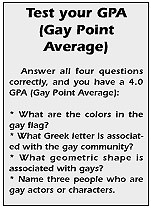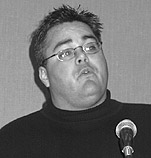
Speaker ‘Out on Fraternity Row’
Shane Windmeyer did not want to be gay when he came out in 1994. Rumors of his homosexuality surfaced after confessing it to a fraternity brother.
“I came out during a chapter meeting even though I feared rejection,” Windmeyer said. “The room got quiet . . . A homophobic member of my fraternity who was a rugby player stood up and said if anybody had a problem with it, they were going to have a problem with him.”
This was Windmeyer’s first hint that coming out was not going to be as tough as he had originally thought.
Windmeyer is a public speaker and co-author and editor of “Out on Fraternity Row.” His book is dedicated to Jon Moore and the other members of Phi Delta Theta fraternity at Emporia State University, who gave him the courage to come out, the love to accept himself and brotherhood for a lifetime.
Approximately 100 fraternity members and members of the SMU Gay, Lesbian, Bisexual, Transgendered and Straight Organization filled the Hughes-Trigg Ballroom to hear Windmeyer speak Monday afternoon.
“I am really proud that all the fraternities were represented here this afternoon, and that the total numbers of attendees was as large as it was,” Interfraternity Council adviser Jim Barber said.
During the opening minutes of the program, students were asked to raise their hands if they were straight or gay. Straight volunteers were called up on stage and administered a test to measure their individual GPA (gay point average).
Windmeyer created a Web site for gay and lesbian fraternity and sorority issues while working on his Masters of Education at Indiana University. The site, www.lambda10.org, is an on-line reference tool for greeks who might need assistance in gay issues concerning college campus greek chapters.
“The 10 comes from the belief that 10 percent of the population is gay,” Windmeyer said. “Many fraternity and sorority alumni from a variety of universities have placed their names and contact information on the site to assist others in need of guidance on this subject.”
Fraternity leaders were asked what they would do if a member were to reveal he was gay.
“A chapter meeting would probably take place,” first-year Phi Gamma Delta Austin Ring said. “He would not be blackballed; he would still be a brother.”
Junior electrical engineering major and Kappa Sigma member David Marchesani said this subject is not discussed. He said that during rush rounds, there was no mention of gay orientation issues.
Any greek organization found hazing or harassing a gay member would face hearings.
“Action would be taken,” IFC president and Sigma Alpha Epsilon member Josh Ball said. “All student chartered organizations are covered under the recently adopted anti-discrimination clause.”
Windmeyer told the audience that most guys who are in the closet or just starting to deal with their homosexual feelings join fraternities and same-sex organizations as a way to get rid of same-sex attractions.
“I dated beautiful women and waited for them to come along, thinking they would change me,” Windmeyer said.
Windmeyer said his decision had a positive impact on the next semester’s rush after coming out in 1994.
“Our chapter actually rushed an openly gay divorced father of two children,” Windmeyer said. “He is a brother today.”
Windmeyer said that homophobia is not restricted to any particular region of the country, college campus or fraternity.
“Intense homophobia is alive and well in the fraternity systems today,” Windmeyer said. “Seldom do we recognize the impact of homophobia on the college fraternity, which is the locus of brotherhood.”
Although all the fraternities present denied they had any gay members, Randy Hubach, president of GLBSO, said otherwise.
“Approximately five fraternity members from all different frats have come to me for counseling about possibly coming out to peers this past semester,” Hubach said. “Today’s meeting helps open beginning dialogues between our group and campus greek organizations.”

Speaker ‘Out on Fraternity Row’








